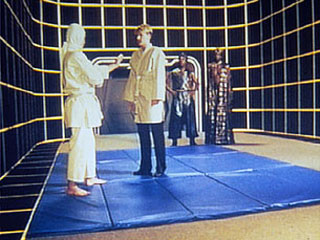This Week’s Finds in Mathematical Physics (Week 240)
Posted by John Baez
In week240 of This Week’s Finds you can learn the value of 00, learn how to play chessgo, and read about Dolan and Trimble’s work on cartesian closed categories and holodeck games:
Posted at October 23, 2006 1:34 AM UTC

Re: This Week’s Finds in Mathematical Physics (Week 240)
I was planning to spend some time this evening writing an account of how Dolan and Trimble’s work fits into the tradition of game semantics, linear logic etc. But I’ve realised I don’t quite understand what Dolan and Trimble are doing. It seems to me that there are some “holodeck strategies” which don’t correspond to elements of the free CCC.
Here’s an example. Sorry it’s so complicated: I’m not sure whether there is a simpler one.
Let , and consider the game
So that I can describe the strategy I have in mind, I’ll draw out the tree and label the moves:
X X a2\ /b2 X |q2 X | X X x\ |a1 /b1 X \ X X q1\ |a0 /b0 X | q0Now consider the following strategy:
(If player 1 plays q0, we play q1; if she then plays a1, we respond at a0, etc.) This is certainly a winning strategy, and I don’t see how it could correspond to any lambda term: the problem is that it exhibits non-local control flow, which isn’t possible in the pure lambda-calculus. In the usual innocent game models, strategies like this are excluded by a “bracketing” restriction, but Dolan and Trimble don’t appear to impose such a restriction.
Perhaps someone could explain where I’ve gone wrong.